Brazilian Jiu-Jitsu is a complex martial art that requires a balance of attributes such as speed, power, and strength. These qualities are crucial in a grappler’s performance and success on the mat. But which one is the most important?
Although speed, strength, and power are significant in BJJ, the technique is crucial. A strong technical base allows grapplers to fully utilize their physical capabilities, resulting in a well-rounded and efficient game. Nevertheless, based on a grappler’s age, fitness, and skill level, they may need to enhance certain attributes, such as power, speed, or strength, to supplement their technique.
But on which one should you focus? Should a BJJ practitioner focus on one over the other at certain points of their BJJ journey?
Speed,Power, and Strength
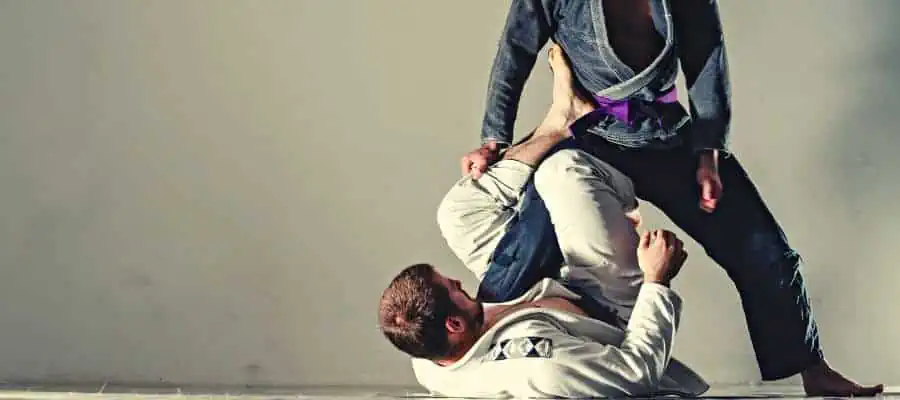
BJJ technique is the most crucial element and should be given utmost importance. Attributes like power, speed, and strength come next, and grapplers should improve these according to their age, skillset, and fitness level. It will help complement their technique and create a versatile game that can be adapted to different situations and opponents.
Young grapplers with natural athletic abilities can gain significant advantages in matches by emphasizing on speed and power. Combining these attributes with proper techniques allows them to execute moves more efficiently and take advantage of any openings their opponents create.
As grapplers age, they may need to adapt their game and prioritize strength to maintain control and stability during matches. This may involve focusing on specific strength training exercises and refining techniques to ensure that they can maintain their effectiveness even as their speed and power decline.
Grapplers need to prioritize technique over physical abilities. They can improve their technique by regularly drilling, practicing, and getting feedback from instructors and training partners. With a solid technical foundation, grapplers can then focus on developing their physical attributes through targeted training like functional strength exercises, plyometrics, and mobility work. This combination of technical knowledge and physical skill can create a well-rounded grappler.
To succeed in Brazilian Jiu-Jitsu, it’s important to have a versatile strategy that can adapt to different opponents and situations. This involves focusing on technique while improving speed, strength, and power over time. By doing so, grapplers can equip themselves with the necessary tools to thrive in BJJ’s dynamic and demanding sport.
How Important is Speed in BJJ?
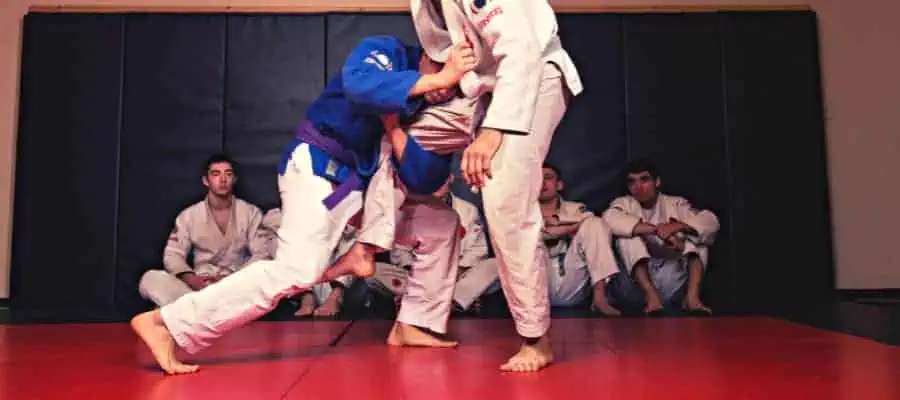
The Different Types of Speed in BJJ:
- Physical Speed: Physical speed refers to a grappler’s raw athletic ability and quickness. Young and athletic grapplers often rely on their physical speed to execute techniques like takedowns and guard passes. While physical speed may fade over time, younger grapplers should capitalize on this advantage while they can.
- Mental Speed: Mental speed is the ability to make quick decisions under pressure, which is essential in BJJ. The speed and accuracy of your choices determine your movements and reactions to your opponent’s techniques. This can be developed through experience on the mat, particularly by focusing on guard and decision-making skills.
- Technical Speed: Technical speed is the ability to execute techniques efficiently and quickly, often gained through repetitive drilling. Technical speed is independent of physical attributes and can be developed by any grappler through consistent practice.
Good technique is important in BJJ, supported by speed, power, and strength. These attributes can effectively create mismatches and exploit an opponent’s weaknesses. It’s important to remember not to rely solely on these attributes, as they may decrease in effectiveness over time.
Using Your Attributes Wisely
To win against an opponent with different strengths, it’s important to adjust your strategy and target their vulnerabilities. For instance, if your opponent is stronger, try to use your speed to avoid their attacks or defense. On the other hand, if your opponent is quick and nimble, use a firm and dominating approach to limit their speed.
As you gain more grappling experience, you should be able to adjust on the fly and switch between speed- and pressure-based games. This adaptability will help you overcome various challenges on the mat.
The Importance of Evolving Your Game
Relying solely on attributes like speed and explosiveness is not sustainable in the long run. As grapplers age and face life responsibilities outside the mat, they must simplify and adapt their game to suit their changing physical abilities.
Fortunately, BJJ offers the opportunity to enhance both mental and technical speed to compensate for decreased physical speed. By varying the pace of their rolls, grapplers can use powerful techniques when needed and slow down when necessary.
How Important is Strength in BJJ?
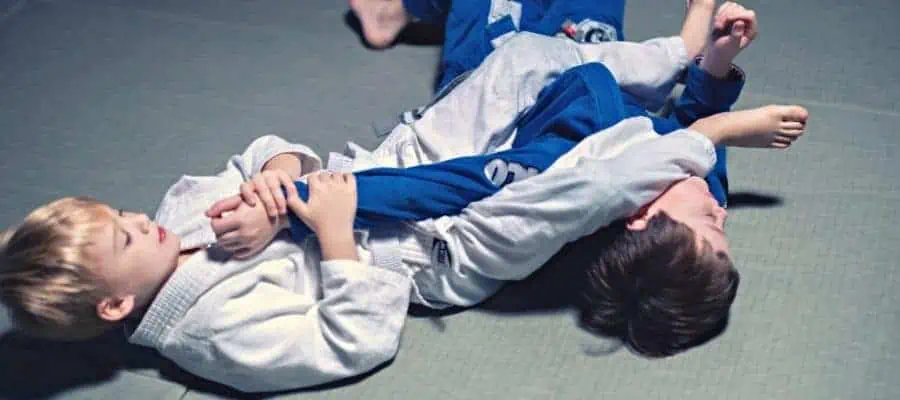
In Brazilian Jiu-Jitsu (BJJ), strength is crucial in a fighter’s capacity to control, defend, and submit to their opponents. Although strength alone isn’t sufficient to ensure victory in BJJ, it can be a considerable advantage when mixed with appropriate techniques and tactics.
- Control and Stability: Strength enables grapplers to establish and maintain control over their opponents, which is crucial in BJJ. A strong base and the ability to apply pressure can make it challenging for opponents to sweep or submit you while also creating opportunities for you to advance your position.
- Submission Resistance: Strength can contribute to a grappler’s ability to resist submissions, particularly when combined with proper technique. By developing strength in key muscle groups, grapplers can effectively defend against various submission attempts and escape precarious situations.
- Grip Strength: In BJJ, grip strength is essential for controlling your opponent, maintaining positions, and executing various techniques. Developing grip strength can enhance your ability to secure and maintain grips, making it difficult for your opponent to break free and advance their position.
How To Leverage and Improve Your Strength in BJJ?
Improving your performance in BJJ requires focusing on technique, efficiency, and targeted strength training. By refining body mechanics and movement patterns, you can effectively apply your strength and save energy during matches. Incorporating BJJ-specific strength training can help develop the muscle groups needed for grappling. Squats, deadlifts, and pull-ups are useful exercises that target important muscles and can be adjusted to BJJ requirements.
To excel in grappling, athletes must focus on building technique and strength and develop strategies that optimize their abilities while still prioritizing technique. This may involve selecting specific positions and moves that effectively use one’s strength while also neutralizing the opponent’s strengths. Progressing in BJJ involves adapting one’s game to best complement their individual physical attributes and skill level.
To enhance their performance in BJJ, grapplers can use their technical skills and strength training to create a balanced game plan. By prioritizing efficiency and technique, grapplers can make the most of their physical power during matches. Furthermore, targeted training and adaptation will enable them to progress and prosper in the sport.
Having strength is beneficial in BJJ, but pairing it with other qualities like speed and power is crucial. Overemphasizing strength could result in a one-dimensional approach, leaving a grappler vulnerable to skilled opponents. To achieve overall excellence in BJJ, grapplers should strive to improve different aspects of their performance, including strength, speed, power, and techniques.
How Important is Power in BJJ?
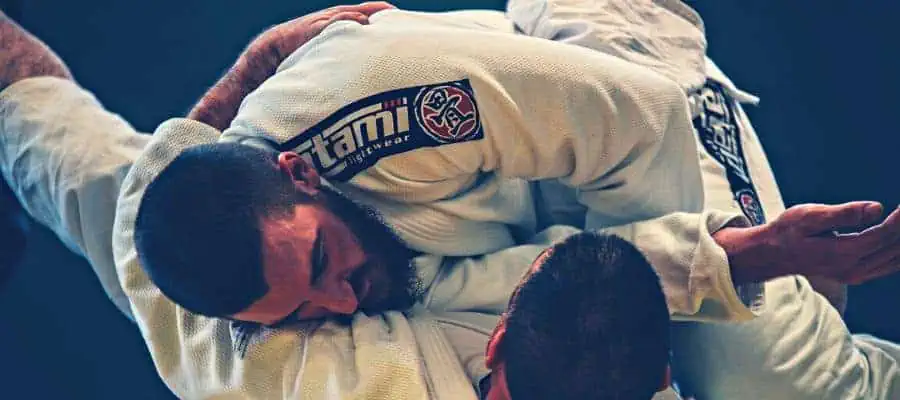
In Brazilian Jiu-Jitsu (BJJ), power is an important characteristic along with speed and strength. It helps enhance the grappling game by allowing quick force generation, which aids in executing explosive techniques and movements.
- Explosive Movements: Power enables grapplers to perform explosive movements, such as takedowns, guard passes, and submission attempts. These dynamic movements can surprise opponents and create openings for successful techniques.
- Bridging and Escaping: Power is essential for executing effective bridges and escapes from disadvantaged positions. By generating force quickly, grapplers can create the necessary space to improve their position and regain control.
- Finishing Submissions: Power contributes to a grappler’s ability to finish submissions by applying force rapidly and decisively. This can distinguish between securing a tap and allowing an opponent to escape.
How To Leverage and Improve Your Power in BJJ?
Combining power-focused training with refining techniques and learning energy management is essential to enhance your BJJ skills. You can incorporate exercises that boost power and explosiveness, like plyometrics (box jumps and medicine ball throws) and Olympic weightlifting (clean and jerk and snatch), into your routine, resulting in better BJJ performance.
To optimize your power in BJJ, it’s crucial to not just rely on power training. Paying attention to technique and timing is equally important. By executing techniques precisely and at the right moment, you can generate more force and apply that power effectively during matches. This means understanding the mechanics of each move and knowing when to use the right level of force so you don’t waste energy.
Power can be a double-edged sword in BJJ, as explosive movements can quickly deplete your energy reserves. To use your power effectively, learning when to conserve energy and unleash your full power is crucial. This involves developing a keen sense of timing and understanding the ebb and flow of a match, allowing you to strike with power when the opportunity presents itself while maintaining your energy for the duration of the match.
Grapplers can effectively develop their power in BJJ and create a dynamic and formidable game by focusing on power training, technique, and energy management.
Although power is important in BJJ, combining it with speed and strength is crucial to develop a comprehensive grappling technique. Focusing solely on power can lead to exhaustion and make you susceptible to skilled opponents who can capitalize on your vulnerabilities.
Technique: The Ultimate Key to Success in BJJ
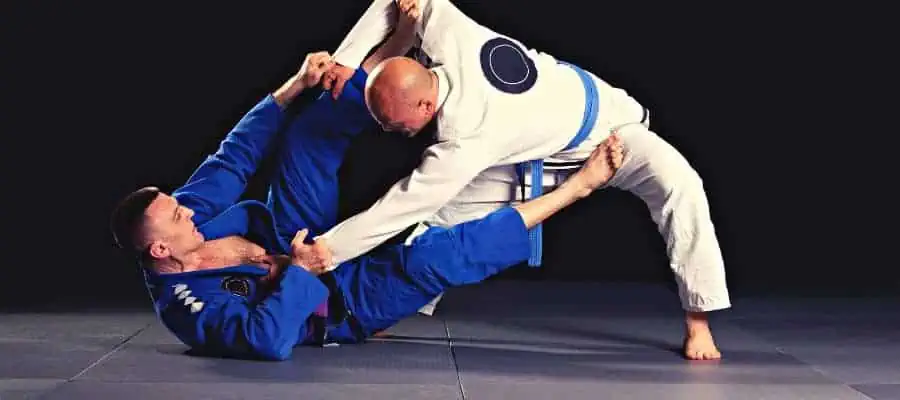
While speed, strength, and power are all important attributes in Brazilian Jiu-Jitsu, it is essential to remember that technique reigns supreme. A solid technical foundation allows grapplers to maximize their physical characteristics and create a well-rounded game.
Mastering techniques and understanding the underlying principles of BJJ will enable grapplers to overcome physical disadvantages and find success on the mat, regardless of their inherent speed, strength, or power.
Can Strength and Power Compensate for Lack of Technique in BJJ?
Although strength and power can be useful in BJJ, they are insufficient to compensate for poor technique. As a grappler faces tougher opponents, having a strong technical base becomes more crucial. Those who prioritize developing their techniques will enjoy success in BJJ in the long run.
In the early stages of a grappler’s journey, their strength and power may allow them to overpower less experienced opponents. Still, this advantage diminishes as they face more skilled practitioners. Relying solely on strength and power can also hinder the development of proper technique, as grapplers may become reliant on their physical attributes instead of refining their technical skills.
To succeed in BJJ sustainably, it’s important to prioritize technique and strategy over relying solely on brute force. This approach will enable grapplers to adjust to different opponents and situations, efficiently using their strength and power while steadily enhancing their overall skills.
How Important is Athleticism in BJJ?
Good athleticism in BJJ – including speed, strength, and power – is helpful. Still, it’s important to remember it shouldn’t replace good technique. Balancing athleticism and technical skills to perform your best in BJJ is best.
Athleticism plays a significant role in improving a grappler’s performance and creating opportunities for success in BJJ. However, it is important to note that athleticism alone does not ensure success in BJJ. Overemphasizing physical attributes can also hinder a grappler’s overall growth and development.
To fully utilize their athletic abilities in BJJ, practitioners should refine their techniques and implement specific strength and conditioning regimens to enhance their grappling. This approach enables them to create a well-rounded, efficient game that optimizes both their physical capabilities and technical proficiency.
What is the Best Way to Balance Speed, Strength, Power, and Technique in BJJ?

To improve their BJJ skills, grapplers should concentrate on developing their technical foundation and include targeted training to enhance their speed, strength, and power. Consistent practice, drilling, strength and conditioning, and strategic planning are essential for grapplers to create a diverse skill set that can effectively use their physical attributes and technical knowledge to achieve a balanced game.
First and foremost, dedicating time to mastering techniques through drilling, practice, and receiving feedback from instructors and training partners is essential. This will help build a strong technical foundation that physical attributes can further enhance.
Incorporating a well-rounded strength and conditioning program tailored to the specific demands of BJJ can help improve speed, strength, and power. This program should focus on functional movements and exercises directly translating to grappling performance, such as compound lifts, plyometrics, and mobility work.
Finally, grapplers must have both strategic planning and adaptability to balance these attributes. They should consistently evaluate their skills, recognize areas that need improvement, and create game plans that take advantage of their strengths while also addressing their weaknesses.
Grapplers can achieve long-term success and growth on the mat by adopting a comprehensive approach that balances speed, strength, power, and technique in their BJJ game.
Conclusion
Grapplers need a blend of technique, speed, power, and strength to succeed in Brazilian Jiu-Jitsu. The technique is the most essential component. Grapplers should prioritize mastering technique and improving their physical abilities to develop a versatile game that can adapt to different opponents and scenarios. A comprehensive approach emphasizing technique mastery and tailored training for speed, strength, and power sets the foundation for long-term success in Brazilian Jiu-Jitsu.
If you found this article useful, you may want to save this pin below to your Combat Sports board.
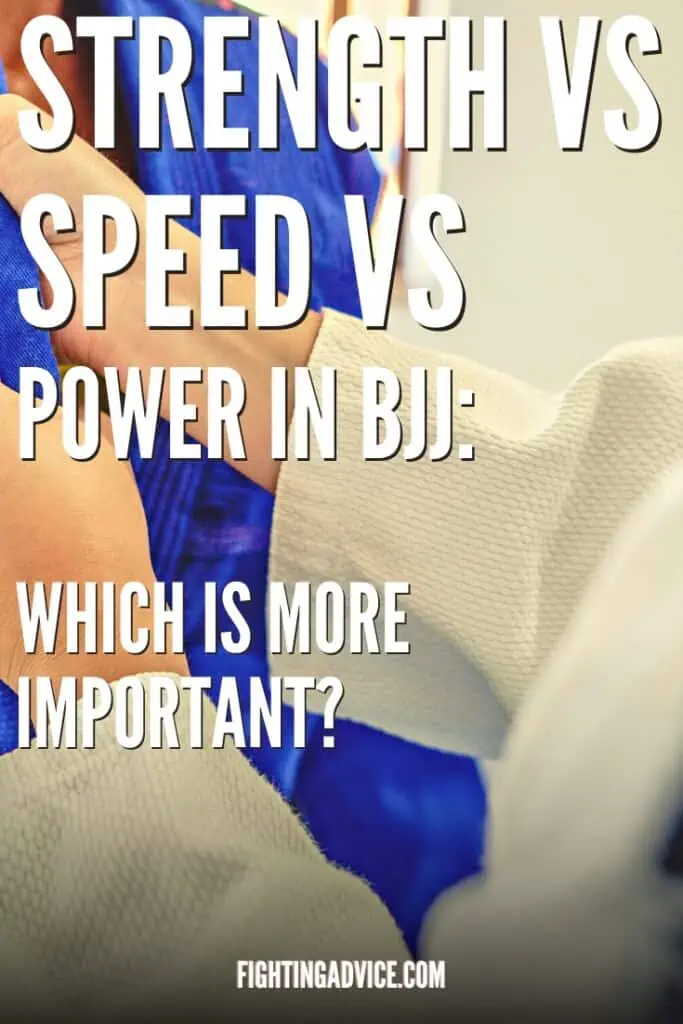
Recent Posts
In the world of Brazilian jiu-jitsu (BJJ), a martial art renowned for its ground-fighting and submission techniques, the question of whether weight matters stirs up considerable debate. Can the...
It is common knowledge that Muslims excel in martial arts, especially Sambo and wrestling. There is no doubt that their success is matched by their religious lifestyle. Until now, we have seen big...
